In this blog I’ll be talking through my educational background and providing some advice to others on how to approach and tackle education.
School years 1997-2008
School times were probably some of the worst times of my life and school was more about survival for me then actual learning, because I was bullied an awful lot through all my school years. For example, I experienced: exclusion, name-calling, getting beaten up, bitten and chucked in puddles and mud, being thrown in and over various objects and having my belongs taken from me. This obviously had a knock-on effect, as I ended up leaving school with very low grades, including a few Fs. I did not choose to do music as a lesson at school, which is quite different from most of my music friends, who seem to have started their musical journey around the ages of 3-7. Being some with disabilities/conditions (Asperger’s Syndrome, Dyspraxia and OCD) also meant I was often chucked into all the bottom sets, regardless of ability where you end up with a lot of the naughty students. In some lessons were I ended up with a different cover teacher every week, each going over the same topic every few weeks – which is also unhelpful.
Advice:
1 Don’t think just because you could not get the grades you wanted at school, it means you’re stuffed: you’re not. It may take you a bit longer once you leave to get where you want, education-wise, but it’s no way impossible.
2 If you are being abused badly at school, changing schools is an option and can be worth it.
Guitar lessons 2008
On my final year of school I decided I wanted to start learning the guitar. I was 15 at the time. I did this as music was becoming a way of dealing with my daily panic attacks so I thought learning an instrument would give me some kind of self-worth. I had about twenty 15-minute lessons in a room at my school with a guitar tutor. Because we were poor I was able to get a discount on the lessons, but even at some points we were still hesitant about doing them because of money worries. For many weeks it seemed quite hopeless for me, but one day there was a click and I went from not being able to play 2 consecutive notes to playing him a nursery rhyme. Once I finished school, I bought guitar tab books: there are quite a few Muse and David Bowie tab books about here (my favourite artists)!
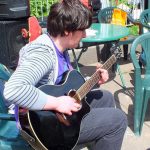
Advice:
1 Music lessons are quick, so don’t spend ages unpacking. Know what you need to take and get it ready asap, as those lessons will go super quick.
2 Being one to one with a tutor means you get their full attention: don’t be afraid to prepare questions and tell them what you want to learn.
Media Diploma, English GCSE and performing arts 2008-2010
Once I left school, I did manage to obtain level 2 Diploma in Media and I also re-sat my English and gained a grade C. The letter grading system in the UK goes from F-A* (at least when I was doing it anyway) and there are no plus or minuses like you get in America. I then did another course which was called performing arts. In this class, I had multiple issues and actually eventually had to drop out. While I was at his college I did a few short courses – singing, live sound engineering and music production – which were with a music school called Point Blank I was nominated for a scholarship by them at one point but wasn’t sure how to take that further.
Advice:
1 Don’t be afraid to leave a place if you are unhappy. Life is too short.
Extended Diploma in Music Practice 2010-2012
I decided to do a music course, as my guitar playing had been improving.
I went to an interview with a nice man called Chris and I was applying for a level 2 btec diploma. He said “I don’t think you’re right for this course,” and I thought “oh crap.” However, he then went on to say “I want to stick you on the higher course, the level 3 extended diploma”!
Although in some ways I was ahead musically on this course, in some ways I was very behind. Some of the people there had been involved with music since they were 6 or 7 and I had only been involved for 2 years with my guitar playing.
I struggled very much to fit in with my peers and also had to deal with the struggle that I was entering into relationships, which involved dealing with people who were not very inclusive about my sexuality, so my emotions were taking full hold at this point and I had no idea how to cope with those or my course. Towards the end of the first year I was able to gain a high grade in song-writing. This gave me some confidence to go into the second year.
We had a major family crisis in my second year and I missed 3-4 months of my course. Somehow I managed to crack out most of the work for the 2 years in the last 2 months. I am not sure what changed, but the stress involved in the family crises and a bad relationship break up were maybe a push to do something for myself and somehow my rush and determination to hurry and get it all done overrode a lot of my nerves.
One of the last thing I did on the course was play and sing three songs in front of about a hundred people: it was terrifying, but it did feel good! One bad thing I resulting from this course was it leading me to developing one of my conditions, tinnitus.
Advice
1 Even the most awful things in your life can result in giving you a boost to work hard if life throws you the courage and determination then use it.
BA HON in Music Performance and Technology 2012-2015
I did not originally plan to do a degree but somehow it happened. During this course, I really pushed myself to be a better writer, performer and composer in every way I could. Unlike a lot of degrees my friends have done, I feel my course actually prepared us for work in the real world. We went through business plans, we were given teaching experience, we performed at public venues and also created and promoted our own personal projects. My final project on the course was a creation of an audio drama and this eventually led to me earning money from other audio dramas. When you start a degree, you’re not the same person as the one who walked in. I walked out with so many more skills, more confidence, a decent grade and things to feel proud of that I had achieved. Doing this course has also led me on to get 16 paid different music projects, some of which I have ended up being finalists for best theme songs.
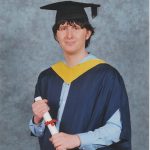
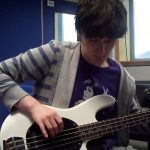
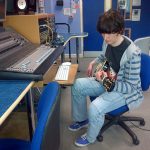
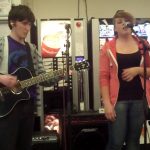
Advice:
1 Some teachers you will connect well with some you won’t. It doesn’t mean either you or they are bad people, but finding teachers who understand you will make the world of difference to you.
2 Don’t be afraid to pester teachers and ask them questions whenever you need to (obviously don’t go banging on their windows at night!).
Maths 2015-2016
So at this point, you’re probably thinking, why did I do maths? Well I was originally thinking about teaching, and no matter how high your degree is, they want a C in Maths and English. I must say, I had a lot of fun on this course. It was nowhere near as intense as anything else I had done in the previous years.
I did learn an important thing on this course. When doing the homework at home I actively had to force myself to do it, but I was doing my music composing without even thinking – I would get that urge, that itch, and do it. This showed me that music creation was what I needed to do, so getting the grade was pointless for me. However, I still wanted to finish the course. I was surprised by the exams, as lots of people were extremely stressed. Some people in other classes were being sick and were really shaken up about it. I honestly found the Maths exams fun and relaxing. Doing this course showed me not just that music was my calling, but also that I don’t want to be teaching people to compose, I want to do that myself.
Advice :
1 Sometimes choosing something which is different from your main interests can teach you an awful lot.
2 Learning something new can be fun. You don’t have to limit yourself to your usual subjects.
Music for the Media and Cinematic Orchestration 2016-
Before I started Music for the Media I was already earning a little bit of money from audio drama. I decided to do this course to better myself. I must say, I learnt an awful lot during this course about sample libraries (aka virtual instruments) and how to compose for picture. It was nice to do a course which just focussed on composing and the production of those pieces.
This year I started Cinematic Orchestration which trains you to write for orchestra, whether that be digital or for a real one, and shows you how all of the individual orchestral instruments work. Both of these course are based online, which is handy as when you are a composer most of your work will be from home anyway. The downside to this is the many hours hunched over a laptop.
Both of these courses have led me to gain more paid jobs and improve my composition, arranging and production skills.
Advice:
1 Learning online can be very good experience, but you do get what you pay for. I paid for mine and found it well worth it. So look around and make sure the course is right for you.
2 Don’t rush! But don’t be a slow coach! I am a compulsive rusher at times. I developed this habit in childhood, but I’m trying to make myself slow down. In some ways the rushing has meant I deliver work fast to clients, even when I am given unrealistic deadlines. If you do have lots of time though, use it – no need to rush. I had 3 years to do Music for the Media, but I finished it in 9 months.
Being a poor, disabled, gay guy has certainly held me back in some ways but I still fight on and encourage anyone else to soldier on with what they want to do as well.
Final bits of advice
1 Education will be completely useless to you if you don’t put the effort in yourself.
2 You don’t have to be part of a school, college or uni to learn. Use social media groups, YouTube and friends etc to help you learn.
3 Money does play a big part in education, sadly, and if you don’t have money it can be difficult to have the same access to resources, transport and types of education. Luckily, for degrees at least, you can get loans and grants to pay for tuition, transport and resources costs, so look into those.
4 If you are in education it can help if you can use discounts – from certain sample library sites, for example – so look into those, as it can save you a fortune. I like to buy from places such as Spitfire Audio, Cinesamples and Sound Iron.
